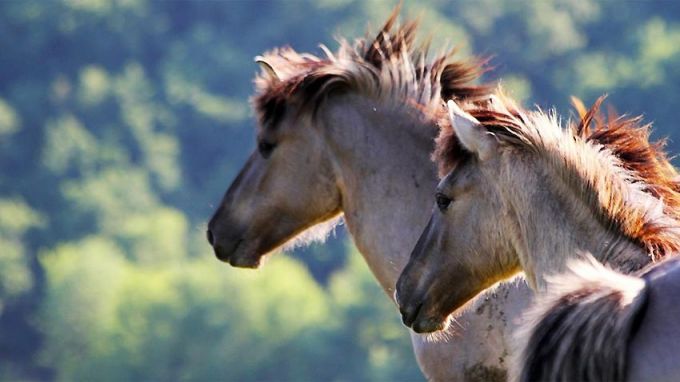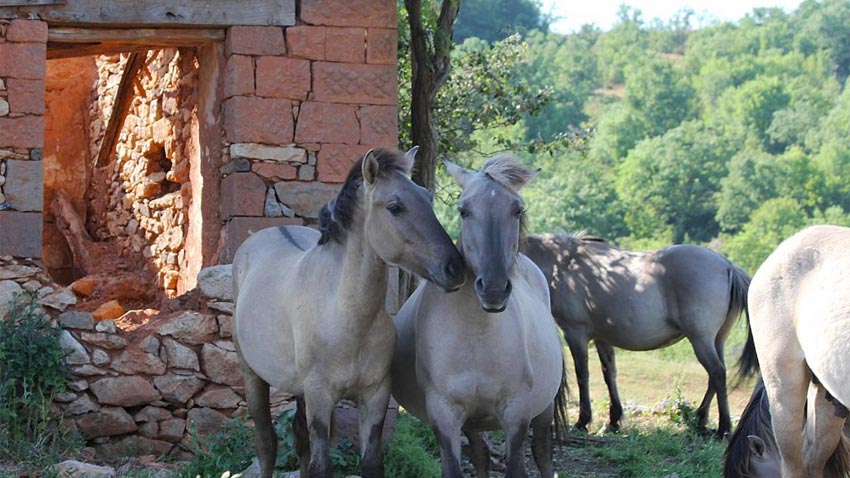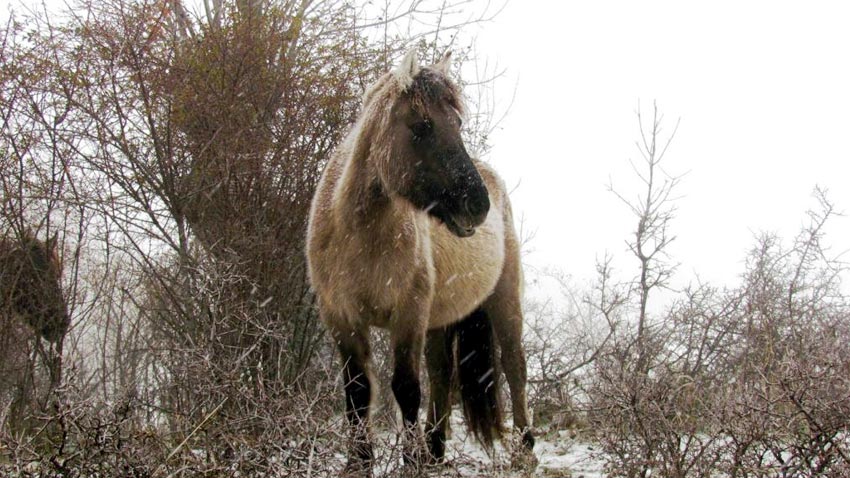 3
3
In the past few years dozens of horses gallop freely in the Eastern Rhodopes. The beautiful animals are of the Konik breed and are the modern copy of the ancient Tarpan horse known as Eurasian wild horse which became extinct in Europe in the 19th century. Currently, nearly 70 horses of that breed live freely in the Eastern Rhodopes near the Boynik area and the abandoned village of Sbor. This is due to the efforts of a Bulgarian-Dutch team which has been working in recent years to rewild nature in this mountain. The settlement and the adaptation of the Konik horse in Bulgaria is a continuation of a Polish project for restoration of tarpan-like horses which started back in 1936. The total number of these horses worldwide is nearly 4,000 and half of them live in the Netherlands. In 2011 twelve Polish Konik horses were brought from the Netherlands to Bulgaria for the first time and were released into the wild in the Eastern Rhodopes. The adaptation of these animals was quite successful and two years later a new group of 40 Konik horses was brought to this area. The animals have already fully adapted in the new conditions and manage to survive the hot and dry summer, the cold and snowy winter and the attacks of the predators.

Experts from the Netherlands came up with the proposals that these animals should receive an official status of wild animals. Thus, Bulgaria can become the first country giving a Wild status to horses living in the wild. At the end of February 2018 a movie about the life of the wild horses in the Rhodpoes was shown at the Faculty of Biology at Sofia University Saint Kliment Ohridski. In a public lecture the Dutch eco expert Frank Zanderink presented the benefits of the wild horses for the people and the nature. More from Frank Zanderink from the Dutch Foundation ARK Natuurontwikkelling:
“What We all know from movies from National Geographic is that in Africa and North America there are big herds of zebras and bison, but what we forgot is that in the past there were big herds of herbivorous animals roaming through the whole of Europe - horses, red deer, cattle etc. Many of the animals you know they all play a part, but what is more important they all play a different role in the eco system, whether it’s the rain deer, the red deer, etc. They all have their own ecological niche. What we always forget as people is that we had cattle and especially horses roaming through Europe for a long time, but these two wild species- the tarpan horse and the aurochs got extinct in Europe. However these two wild animals were not all killed, but they were also domesticated. They were taken by farmers. In these days a lot of people from rural areas are changing these areas into urban areas and keep or sell their domestic animals, so there is hardly any domestic animal left going into the forest for keeping up open this forest. In the 1980’s in the Netherlands we thought of the idea that through all the centuries in Europe there had been roaming cattle, roaming horses, but they got extinct and replaced by domestic animals. So we want to get this process back again and start reintroducing wild-living horses. We chose one for the Netherlands called a Konic horse. We imported this horse from Poland. We started in 2009 in the Eastern Rhodopes with the New Thracian Gold project and in 2011 we started to bring and transport Konik horses from the Netherlands to the Eastern Rhodopes.

We placed one group of horses near the mountain range of Boynik and one near the abandoned village of Sbor. If you don’t bring in horses or cattle which eat the vegetation, then the canapé of the forest will close and you will lose a lot of biodiversity. They are mainly grass eating, but if grass is not sufficient they start eating leaves or twigs. Together with other herbivorous animals the horses manage to keep the landscape open. They play a key role for biodiversity with opening up the forest. Keeping it open there is room for insects, flowers, etc. Flowers attract insects and insects attract birds. If there are no wild horses or wild cattle, the grass will be tall and the Eurasian ground squirrel (suslik) will disappear. We are convinced that keeping open the area is mostly beneficial for other animals and plants in the ecosystem. The animals are not competing. They all fill in their own niche. So it is not true if you say when we bring in horses they eat grass and there is less food for the red deer for example. Actually it is proven that horse and cattle facilitate the food for all the other herbivorous. There is even more food when you have wild horses and cattle roaming in the nature.”
The Bulgarian-Dutch team of eco experts is working hard to have the herd of Konik horses legally recognized as wild animals and receive a Wild status. If these animals do not receive this status they will be treated as domestic animals, which means they will have to go under regular medical examination by a vet, they will be marked, etc. However, this is not necessary, because these animals can live freely without human presence around.
English version: Kostadin Atanasov
Photos: statuswild.euA team of 12 Bulgarian 11th grade students, led by Elitsa Pavlova, won first place among participants from around the world in the prestigious Live in a Healthy Space Design Competition organized by the National Space Society (NSS)..
On the occasion of the upcoming National Holiday - March 3 and 147 years since the Liberation of Bulgaria from Ottoman rule, the Regional Library in the city of Yambol is conducting the campaign "Let's Read for Bulgaria". The goal is..
The Aviation Training Center at Sofia Airport has received accreditation from the Airports Council International (ACI) and joins the elite group of 21 training hubs, including those at leading European airports such as Munich,..
A team of 12 Bulgarian 11th grade students, led by Elitsa Pavlova, won first place among participants from around the world in the..

+359 2 9336 661
